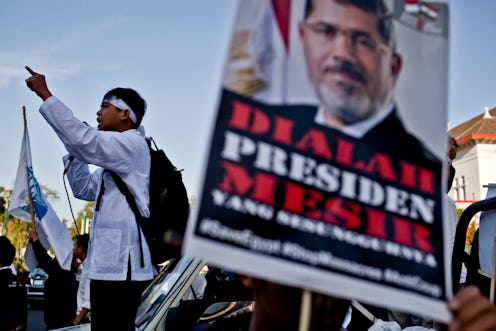News
Egypt Passes Scarily Restrictive "Protest Law"
As thousands of demonstrators gathered in Cairo and around Egypt Sunday to mark the 100th day since security forces clamped down on and killed hundreds of Muslim Brotherhood supporters, Egypt's interim President Adli Mansour passed a controversial new law that would severely regulate protests. The bill has already drawn criticism from both political and human rights groups, who argue that the legislation will severely restrict freedoms and tighten the military's grip on the opposition.
The legislation, which will take effect later this week, reportedly gives security forces the power to bar any protests or public gatherings, if they receive information that the gathering "threatens public safety or order" — but just what a threat would be, or what kind of information is needed, is up for interpretation. It also requires that Egyptians notify officials three days ahead of any planned protest, and would ban group meetings in places of worship, such a mosques. "Processions" of over 10 people are legal only if held for "non-political" reasons, and any violations could result in fine up to $4,360.
According to reports, the bill also worryingly gives the police the right to use force pretty much however it wants, including through tear gas and clubs, as long as it gives a warning. Human rights groups, who saw an earlier draft of the bill, have said that the legislation also allows the use of birdshot, leaving out a crucial article that would have prohibited excessive use of force.
"Such an omission is the most serious indicator of the real intentions of the current authorities, which claim they are seeking to legalize and regulate peaceful assembly, while this actually is yet another attempt to legalize repression," the groups said in a statement Friday.
Various drafts of the bill have come under fire since the interim government first suggested it last month, with the Human Rights Watch saying saying that it would "effectively give the police carte blanche to ban protest in Egypt." The Arabic Network for Human Rights said that it "confirms its complete refusal of the protest law because it principally aims at confiscating the right to protest peacefully and the sit-ins. It will contribute to legalizing the impunity of police officers that had involved in violence acts."
"They could have stuck to earlier versions, where if the interior ministry wants to ban a protest, the onus is on them to go to court and seek a ban," said Heba Morayef, the Egypt director for Human Rights Watch. "Instead they've done the opposite. The end result is that we could see an increase in violent crackdowns on peaceful protests."
The law comes less than two weeks after Egypt lifted a three-month state of emergency and nighttime curfew, which had been implemented on Aug. 14 and extended on Sept. 12, after the bloody military crackdown on the Muslim Brotherhood. Scores of supporters of the ousted President Mohammed Morsi have been killed by military and security forces since Morsi's removal from power, and Egypt's political situation has caused rifts with the international community as well. Although the U.S. has been careful to refrain from calling the ouster a "coup", the Obama administration did cut some military aid to Egypt, and just yesterday, the Egyptian government asked Turkey's ambassador to leave because of its support of the Muslim Brotherhood (Turkey has called Morsi's removal an "unacceptable coup").
